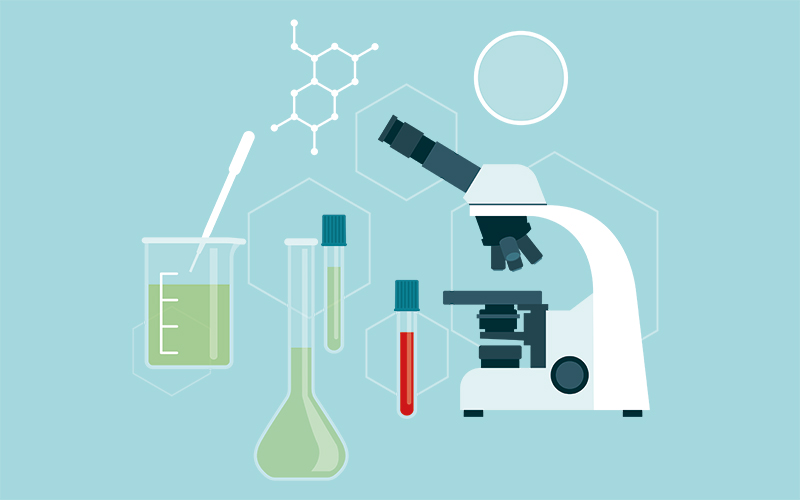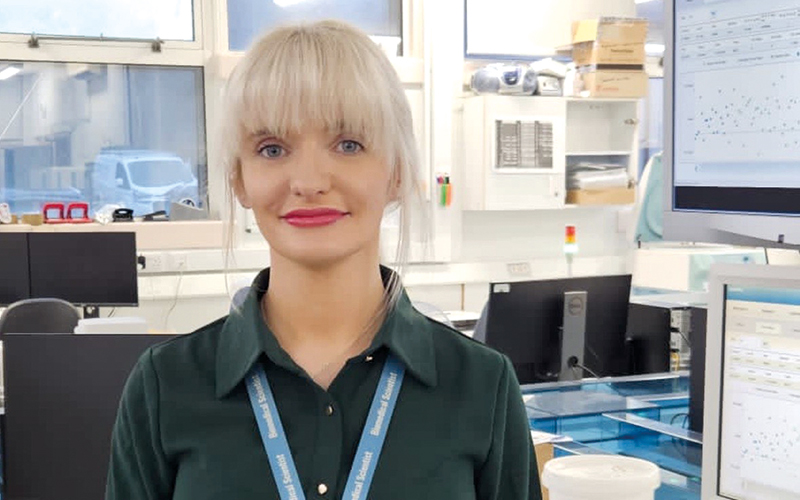Biomedical Scientist Danielle Byrne discusses her journey from cellular pathology to biochemistry and how and why she made the move.

My journey as a biomedical scientist began in February 2020.
I remember receiving the email offering me my trainee post and I couldn’t quite believe my luck. In Northern Ireland, a regional recruitment list is compiled annually and you are placed as and when positions become available. You are able to select which disciplines you wish to work in and in which areas. To give myself the best chance of being offered a job, I put down all of the disciplines and most of the health trusts.
Cellular pathology
I had a very limited working knowledge of the disciplines, as I had only completed a six-week placement in haematology in 2016. The discipline I was offered in 2020 was cellular pathology.
I remember my first day as though it were only yesterday – meeting the team, beginning in specimen reception and getting used to all the weird and wonderful specimens.
A few weeks later, COVID hit and the specimen numbers drastically fell. I started my registration portfolio and approximately a year later I had my verification and became a registered biomedical scientist.
My days in cellular pathology mostly consisted of embedding specimens, trimming blocks and microtomy. I started my specialist portfolio in histopathology and also completed four modules at MSc level that were also histology related. As time went on, I began to question if this was the career for me.
The wrong discipline
I attended the IBMS Congress in March 2022 and spoke to many people from various disciplines and attended some lectures in biochemistry and transfusion science, as these were subjects that interested me in my university days. I remember feeling a sense of regret that I had chosen the wrong discipline for me.
“I had the natural fears and concerns anyone would feel when faced with a similar decision”
In October 2022 an opportunity arose for me to move to the clinical biochemistry lab within the same hospital. I had all of the natural fears and concerns which anyone would feel when faced with a similar decision. Is the grass always greener? Will the people be as friendly? What about my MSc and my specialist portfolio? Will it seem repetitive/lack stimulation due to automation?
I made the decision to take the plunge.
First day
The first day was daunting but at the same time it felt familiar, so not exactly as though I was starting a new job. My first section was the main specimen reception, in which I spent the first few weeks. This was a great introduction to biochemistry and the other disciplines. I have fond memories of my time there with the friendly MLA staff and the introduction to PIDing and sorting and labelling samples.
I then moved on to HbA1c analysis in February 2023, and I absolutely loved it. By that stage I had settled in to biochemistry and I also felt that I was making progress.
With regard to my MSc, I decided to defer the project, as working in a new discipline, especially from one with little automation to one where there was a lot of automation, with many different tests, and pieces of equipment which I had zero experience of, I decided I wouldn’t put pressure on myself (something which I tend to do naturally, so I did struggle a little at this prospect) until I felt more settled and confident. I then began my specialist portfolio in May 2023.
The best decision
I have moved to different parts of the lab and since November I have been working on analysers.
How do I feel about the change of discipline a year later? I can honestly say I absolutely love biochemistry and I can say with confidence that it was the best decision I have ever made, in a professional sense.
The lab which I am working in is such a supportive environment, on both a professional and personal level, I enjoy the work I do and I feel positive about my career developments in this area. Personally I don’t feel that automation means boring, as there are still many other hands-on tasks to keep the lab running. This is a general misconception that I had, and from talking to other people in histopathology, it seems to be a common idea.
Consider a change
My advice to others who don’t feel happy in their choice of career and are potentially considering moving outside of this profession would be to consider a change of discipline first. Consider speaking to colleagues from the other disciplines and asking them about their typical day in work, dusting off some of your old university books and notes and seeing if you have an interest in this area and, of course, attending Congress, if at all possible.
“I moved on to HbA1c analysis and I absolutely loved it. By that stage I had settled in to biochemistry”

Make use of the various resources we have that are readily accessible, such as the IBMS chat on X (Twitter), read through the various specialist portfolios on the IBMS website, or even drop some of the friendly biomedical scientists who are active on social media platforms a line – I’m sure they’d be more than willing to provide advice where they can or give you an overview of what they do. I am a firm believer in networking and building interpersonal relationships within the biomedical science network as I do feel that in times where you’re unsure of your next step, there is always someone there willing to provide guidance and support.
Danielle Byrne is a Biomedical Scientist working in biochemistry at the Southern Health and Social Care Trust in Northern Ireland.
Image credit | iStock
